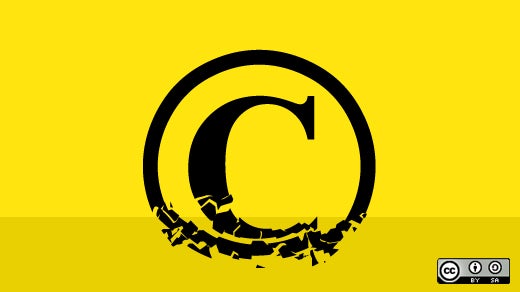Open source software licenses and copyright law have a complex relationship. People often say that open source turns copyright on its head and loosely refer to open source licenses as "copyleft" licenses. Indeed, the idea of a license that grants perpetual rights to copy, modify, and distribute a work—and requires licensees to attach the same terms to any downstream work—certainly feels like the antithesis of copyright law's protectionist character.
Yet open source licenses (in their current forms) rely on copyright law. Copyright law supplies the bundle of statutory rights that empower the “keep it open” requirement of an open source license. Without copyright law, an author would have to find another legal theory to prevent others from, for example, taking a developer's code and hiding it behind technological walls. And what do you sue for when someone violates the terms of an open source license? Copyright infringement (among other things).
Clearly, copyright law matters to the open source community, and so copyright reform also matters. Enter a mid-November now-you-see-it-now-you-don’t policy brief from staff of the Republican Study Committee (RSC), an independent research organization for over 160 Republicans in the House of Representatives. The brief, titled "Three Myths about Copyright Law and Where to Start to Fix it," embraced sweeping copyright reform to cheers from the technology community and elsewhere—only to be withdrawn the next day, to a chorus of jeers. (Examples below.)
The brief is currently available at Wikimedia Commons.
Summary of RSC brief
Myth #1: "The purpose of copyright is to compensate the creator of the content." Noting copyright's stated purpose in the U.S. Constitution—"to promote the Progress of Science and the useful Arts"—the brief argues that the current copyright regime focuses too greatly on the compensation of content creators and not enough on the broader goal to promote content innovation and productivity.
Myth #2: "Copyright is free market capitalism at work." The brief argues that copyright law "violates nearly every tenet of laissez faire capitalism" because it is fundamentally a system of subsidized monopolies granted by the federal government.
Myth #3: "The current copyright legal regime leads to the greatest innovation and productivity." According to the brief, our current copyright regime fails in this regard because it has become excessive in its legal protections and the time over which those protections apply, thus encouraging rent-seeking more than innovation.
The brief then notes the current copyright term—life of the author plus 70 years, and for works authored by corporations, 120 years from creation or 95 years from publication—and contrasts that with the first U.S. copyright law, which was passed near the time of the framing of the Constitution and provided for 14 years of protection, renewable once for another 14 years. The ever-lengthening copyright term, the brief argues, stifles innovation by discouraging value-added content creation. And here the brief is at its most provocative, opening its list of the copyright-stifled with the "DJ/Remix industry" (getting or buying permissions from record companies is too prohibitive) and following on with a discussion of how copyright’s protections thwart scientific study (too many papers in "locked vaults"), prevent the creation of vast digital public libraries (few modern works in the public domain), block new industries from ever blooming (such as a "pop-up" layered annotations of existing media), and obstruct journalistic oversight (incriminating documents claimed protected by copyright).
The solutions proposed by the brief will be familiar to copyright reform-minded folks: reform (read: reduce) available statutory damages for copyright infringement, clarify and expand on fair use of copyrighted materials, sanction those who make false copyright infringement claims, and "heavily" reduce the copyright term while allowing for only disincentivized renewals. The last of these gets a more detailed treatment: a suggestion to slash the copyright term to an initial term of 12 years for new works, with renewals available for consecutive periods of 12, 6, 6, and 10 years at increasing fees based on the work's generation of revenue.
The brief ends with a clarifying acknowledgment that some copyright protection is warranted, coupled with a striking quote: "Current copyright law does not merely distort some markets—rather it destroys entire markets."
If any of the ideas or proposals in the brief were to be embraced in earnest, and were to lead to real legislative reform, what could this mean for open source? It’s hard to say—one could imagine, for example, that if the copyright term were greatly reduced, companies could see a viable business model in waiting for the expiration of copyright on some open source licensed components, assembling the components into a complete offering, and locking it in binary-only form—and if this happened on a huge scale, open source's hereditary nature could be deprecated, even with the original components remaining in the public domain. But this feels like a stretch. All in all, the brief certainly appears to fall on the side of openness, and that's probably a good thing. One can only hope that the brief's release has opened a new dialogue about copyright reform and that its awkward retraction isn't effective at closing that dialogue down.
Responses from the community
Cheers
- House Republicans: Copyright Law Destroys Markets; It's Time For Real Reform
- House Republicans release watershed copyright reform paper
- Is Copyright Reform a Republican Issue? New Report Aims to Expand Fair Use
- An Anti-IP Turn for the GOP? (UPDATE: RSC disowns and pulls the brief)
Jeers
- That Was Fast: Hollywood Already Browbeat The Republicans Into Retracting Report On Copyright Reform
- Influential GOP group releases, pulls shockingly sensible copyright memo
- GOP’s Short-Lived Shift on Copyright Law
- Heroic and Radical Republican Study Committee Copyright Reform Proposal Retracted under Pressure from MPAA and RIAA
- The Case of the Vanishing Policy Memo
- The Magically Disappearing Copyright Report







4 Comments